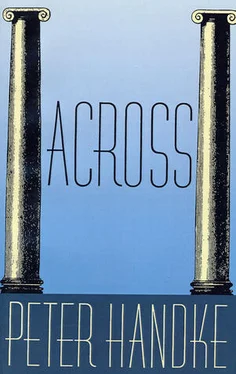Peter Handke - Across
Здесь есть возможность читать онлайн «Peter Handke - Across» весь текст электронной книги совершенно бесплатно (целиком полную версию без сокращений). В некоторых случаях можно слушать аудио, скачать через торрент в формате fb2 и присутствует краткое содержание. Год выпуска: 2000, Издательство: Farrar, Straus and Giroux, Жанр: Современная проза, на английском языке. Описание произведения, (предисловие) а так же отзывы посетителей доступны на портале библиотеки ЛибКат.
- Название:Across
- Автор:
- Издательство:Farrar, Straus and Giroux
- Жанр:
- Год:2000
- ISBN:нет данных
- Рейтинг книги:3 / 5. Голосов: 1
-
Избранное:Добавить в избранное
- Отзывы:
-
Ваша оценка:
- 60
- 1
- 2
- 3
- 4
- 5
Across: краткое содержание, описание и аннотация
Предлагаем к чтению аннотацию, описание, краткое содержание или предисловие (зависит от того, что написал сам автор книги «Across»). Если вы не нашли необходимую информацию о книге — напишите в комментариях, мы постараемся отыскать её.
Across — читать онлайн бесплатно полную книгу (весь текст) целиком
Ниже представлен текст книги, разбитый по страницам. Система сохранения места последней прочитанной страницы, позволяет с удобством читать онлайн бесплатно книгу «Across», без необходимости каждый раз заново искать на чём Вы остановились. Поставьте закладку, и сможете в любой момент перейти на страницу, на которой закончили чтение.
Интервал:
Закладка:
Later on, in the air terminal building, where the sun had begun to turn orange and the unoccupied ticket windows seemed extraordinarily massive, an early passenger or greeter was sitting alone in the waiting room, which suggested a bus terminal more than an airport. Later the room filled up. The people standing there had long shadows. The windows were manned, the baggage conveyor belts running. And in the Rent-a-Car stalls — those of one company red, of the other yellow — the mascaraed lashes, the bleached hair, and the hands with lacquered fingernails resumed their places. A uniformed guard with a submachine gun crossed the room, his head tilted slightly back, his eyes half closed, as pale and stiff as a corpse.
Something drew me to all these people, even though the air inside was close and smelled like fermented stale bread.
The sun went down. In the parking lot, which had been deserted all afternoon, long lines of cabs were now waiting with their roof lights on. A movement ran through the leafy plants that twine through the whole lobby, as though in accompaniment to the song pouring from the transistor radio that a young fellow in the shell chair beside me was holding up to his ear. A dog barked and the glassed-in lobby transformed the sound into the wailing of a pinball machine. The plane that was just landing would fly on immediately to another country. It was the end of the holiday; an unusually large number of passengers got out or pressed toward the entrance on the other side. Newly arrived passengers, waiting for their luggage, were unrecognizable shadows behind a frosted-glass door, while friends and relatives crowded around a narrow opening to wave or to signal in some other way. A traveler emerged from the automatic double doors, walked over to one of the Rent-a-Car stalls, where the girl in charge, leaning over the counter like a seller of lottery tickets, held out a finger with car keys on it; he grabbed them in his mouth and at the same time snapped at her finger, which the girl did not pull back but thrust in a little deeper. While the man rushed out to his car, the girl unfolded a piece of paper he had tossed to her, and slipped it under the telephone.
I sat bolt-upright, my legs close together and my hands on my knees. Outside, over the road to the city, a strange new signal shone amid the usual traffic lights, billboards, and cranes: the rising, fiery-red full moon. Inside, between the wings of the door, a young woman appeared. Half hidden by the people in front of her and darkened by those behind her, she was visible as a line from neck to hip. I stood up and took off my hat. In disengaging herself from the crowd, the woman stumbled and described a semicircle. Then, standing to one side, she turned away from the exit, as though wishing in that way to attract someone’s attention.
No one came. The last cab drove away. The plane took off. As it rose into the air, the din it had just made in speeding over the runway bounced back from the Untersberg. The whole rocky mass was still rumbling and roaring, while the plane was already far in the distance, no bigger than a dragonfly. Had the woman’s back, along with the triangle of her scarf, come closer in the meantime, or had they receded? The lobby was almost empty when at last she turned around. Her face revealed a thoughtful beauty; of all beauties, the most thoughtful.
First, she looked out at the fields through the plate-glass front; then at the hat in my hand, as though this were a prearranged sign of recognition; and, last, into my eyes. It was a two-way glance that nothing could cancel out, though after it we blinked into empty space as if something terrifying had happened. She said something in an indeterminate accent, but the accent may have been only momentary. I went over to her and took her in my arms. I was overwhelmed by the one word that was spoken between us: “ Du. ”
We went slowly up to the second floor; or possibly we ran. I took the key from the untended reception desk. The short corridor seemed to have widened into a suite of rooms. The spotlights in the ceiling cast a procession of circles on the carpet. There was no sound but the soft whirring of the lamps.
She jostled me with her hip, intentionally or perhaps not. She laughed at the room, but the look in my eyes made her grave. She stumbled, or pretended to stumble, across the threshold, which was only a strip of grooved hard rubber.
Seen in the slanted windowpanes of the control tower, the headlights of the cars driving straight on the road below were moving in curves. On the abandoned tables of the workers’ cafeteria stood glass sugar bowls, their lids all casting identical round shadows on the white crystals underneath. In a dark room to one side, an electric iron and a baby’s bottle were discernible on the windowsill.
Through the dark hotel room, whose only light came from the airfield — a multicolored dotted pattern on the walls — ran a shudder, followed by stillness. Does an individual, doubled up in dying, circling around himself, not sometimes feign to be two hostile beings locked in a life-and-death struggle? Here, for once, the reverse was true: two beings quietly side by side, not dying. Far enough apart to bring them close. Someone asked: “Do you remember?” as though there were a memory in common. Someone said: “Then ‘weakness’ is another word for ‘being in the right.’” No one said: “Save me”; at the very most, “Help me.”
The room was cramped, yet the two bodies made space for themselves. We fitted nicely into one of the beds, at the foot of which lay a white, towel-size mat. Looking for her in the dark, I sensed her presence all the more deeply. No, no need to look for her. She was there. Moved to the core by her body’s being there, I hesitated — and by my hesitation she knew me. Yes, it was the woman who recognized the man; and it was she who with a resolute, majestic gesture united with him.
In passion, our bodies did not diverge but remained together. They consummated the act, which was not a frenzied struggle but a mighty game, the “game of games.” In that night of love, another time reckoning and another sense of place took over. Now it’s raining (the wet concrete runway is a quiet lake). Now the full moon is shining on a little gondola-shaped cloud with two lovers in it. Now the shower of sparks from the intersecting bus wires is in your body. Now your shoulder is your face again. Now the eastern sky is a Spanish-lilac color. Now for a moment the woman’s speaking becomes a singing. She means nothing by it; she is only singing her beauty.
Dreams came. I stepped out of the story, walked down a sloping meadow by night; the brook at the foot of it shimmered in the morning sun; there were human silhouettes on the bank. Was it another dream when, head tilted back, I looked into a woman’s womb as into the inner recesses of a cupola tapering from turn to turn? When I wanted to convince myself, the eyes of a beautiful stranger rested on me. It must have been a dream in any case that, one with each other, we became a native of the world’s center.
The strange face with the closed eyelids and lips made me think of a primeval stone figure, expressing — it is uncertain which — bliss, mischief, or danger; in the next moment, it might smile at me or spit at me or both at once. Instead, it opened its eyes and looked at me; and a woman’s voice — anonymous no longer — said: “I must leave you now. It’s late.”
Outside, a procession of small cars with blinking lights on top drove along the runway. During the night, the moon had waned a little. A baggage truck rattled; a gate opened in the parking area. Smoke rose from the farmhouse at the end of the runway; in the courtyard, a slowly striding male figure on his way to the barn.
When I asked her when I would be seeing her again, she replied: “Once upon a time there were.” Did that mean that wishes were in order? “Not wishes, but questions.” So I asked her how she saw me. I was in need of being described a little. “Give me a portrait of myself. It can be false if you like.”
Читать дальшеИнтервал:
Закладка:
Похожие книги на «Across»
Представляем Вашему вниманию похожие книги на «Across» списком для выбора. Мы отобрали схожую по названию и смыслу литературу в надежде предоставить читателям больше вариантов отыскать новые, интересные, ещё непрочитанные произведения.
Обсуждение, отзывы о книге «Across» и просто собственные мнения читателей. Оставьте ваши комментарии, напишите, что Вы думаете о произведении, его смысле или главных героях. Укажите что конкретно понравилось, а что нет, и почему Вы так считаете.












